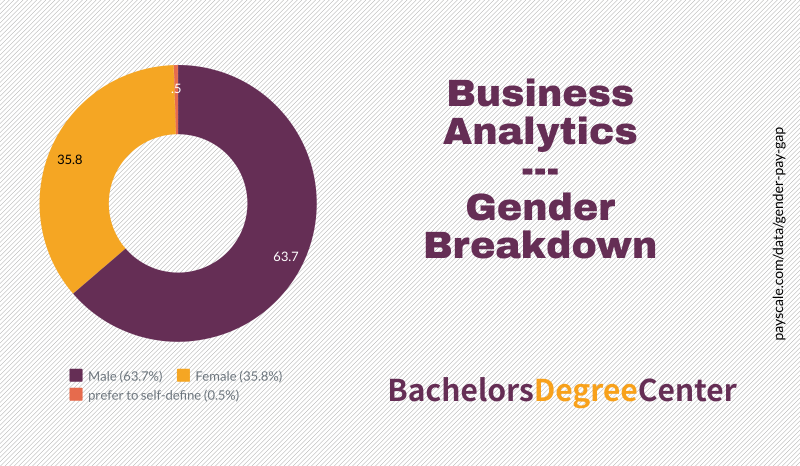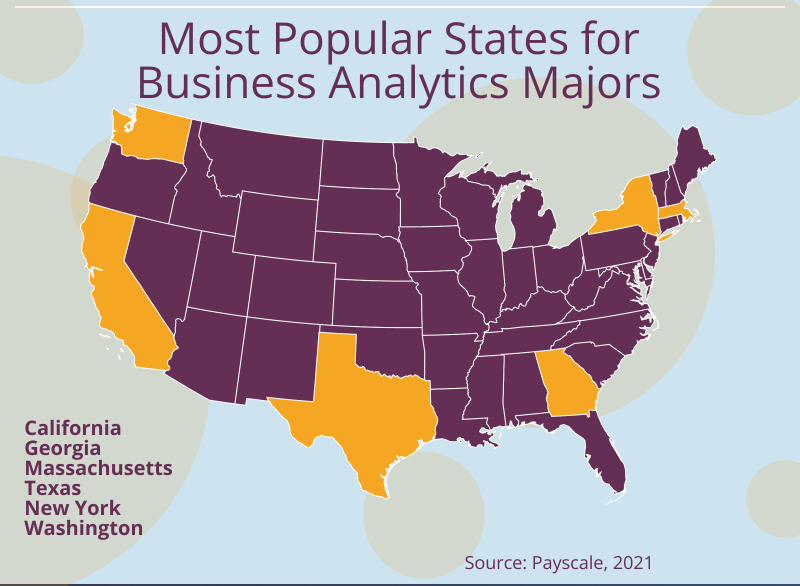What is business analytics? Business analytics involves data management and business intelligence. It also often includes statistical analysis used to transform data into useful knowledge. Further, business analytics identifies trends and outcomes that help stakeholders make decisions based on data rather than intuition alone.
In order to understand business analytics, it’s helpful to know some of the jargon associated with the field.

The main components of a typical business analytics dashboard include:
- Data Aggregation: Gathered data is organized and filtered for reporting and analysis.
- Data Mining: Involves the process of sorting through statistics, databases and machine learning to find relationships and trends that can drive business process improvements and greater profitability.
- Association and Sequence Identification: Business analysts find predictable trans that they can associate with actions. When these trends occur in a particular order, they fuel predictive analytics.
- Text Mining: Unstructured text datasets are difficult to categorize, analyze or organize. Advances in artificial intelligence and machine learning have simplified the quantitative and qualitative analysis of text datasets.
- Forecasting: Using historical data, data analyst can predict future behaviors or events.
- Predictive Analytics: Involves statistical techniques used to create models together information from store data. In the process, analysts identify patterns and create a probability score for various actions taken by stakeholders.
- Optimization: This process puts predictive analytics to work to create simulations and identify best-case scenarios.
- Data Visualization: Automated charts and graphs facilitate the conceptualization of data patterns.
What is business analytics? Descriptive analytics studies historical data to predict how a metric will react to certain variables. Predictive analytics uses historical data to determine likely future outcomes. Finally, prescriptive analytics combines both descriptive and predictive analytics to provide insights on probable events. Prescriptive analytics helps users anticipate and react to what is likely to occur.
Examples include using clinical data to predict patient outcomes and streamlining service at fast-food restaurants using the identification of peak service hours.
What is business analytics software? Platforms that consume and process huge datasets provide insight that businesses can exploit to adjust their business operations.
What is Analytics and Business Intelligence?
What is business analytics vs business intelligence? Business intelligence is similar to business analytics. However, business intelligence zeroes in on descriptive analytics as well as gathering, storing, and managing data in order to bring new perspectives based on known data.
On the other hand, business analytics uses prescriptive techniques such as modeling, data mining, and machine learning to predict the outcomes of certain events. Although they often involve the same process is, they answer different questions. Business intelligence answers the question “What needs to change?” whereas business analytics asks, “Why is this happening?
Accreditation for Business Analytics Programs
There are two types of accreditations, national and regional accreditation. It’s important to ensure that the college or university you choose is properly accredited. This can affect things such as how many credits transfer if you switch to another school and how seriously employers take your education.
National accreditation typically refers to vocational schools, trade schools, and online universities. It also applies to for-profit colleges and universities. These programs typically vary quite a bit from four-year universities and are usually only evaluated every few years.
Sometimes, nationally accredited schools have lower tuition rates, and they are often easier to get into.
Regionally accredited schools include nonprofit universities as well as public colleges and universities. Regional accreditation is typically more rigorous and has a generally higher standard than national accreditation.
Attending a regionally accredited school usually makes it easier for students who wish to transfer their credits to another school with regional accreditation. Credits earned at a regionally accredited school usually count toward the prerequisites for graduate school.
The US Department of Education maintains a database of institutions and programs that meet the requirements of various accreditation agencies.
When it comes to business analytics, programs are usually housed in the business school, or in the computer science or technology school. While this distinction may have little impact on what is taught, it will have an impact on the accreditation, as business and computer science programs are accredited by different agencies. Computer programs are often ABET accredited, while business schools may be accredited by the ACBSP or the AACSB.
Types of Business Analytics Degrees
Is a degree in business analytics worth it? Graduates with a business analytics degree are in hot demand right now due to a lack of specialists in this field. Business analytics involves using data to create mathematical models or algorithms that help organizations make better choices and meet their business goals. Data-driven decision-making relies on predictive analytics. This model is important to numerous industries including real estate, finance, and retail.

So, is a business analytics degree worth it? From both a supply and demand and remuneration standpoint, the answer is certainly yes.
The best reason why you might want to study business analytics is that getting your degree in the field will help you launch a career in the industry.
People choose business analytics for numerous reasons. Some people transition into a business analytics position from another role. Getting a degree in the field can help them quickly catch up to the latest trends and techniques. Although some people may organically move into business analyst roles, it’s better to solidify their knowledge with a degree from a reputable, accredited college or university.
Studying business analytics is also the best way to break into the field if someone doesn’t have prior experience. This can provide the skills, knowledge and abilities needed to stand out to employers or qualify for graduate programs.
This is a good time to break into the industry, according to data from the US Bureau of Labor, which predicts fast growth in the following business analytics-related roles:
- Computer and Information Systems Manager
- Operations Research Analyst
- Computer Systems Analyst
If these jobs sound interesting, it might be worthwhile to get a business analytics online degree. Online business analytics degrees also give learners the freedom to continue their education if they already work in the field and don’t want to interrupt their career.
Online schools give students the chance to game knowledge and experience needed to become effective leaders who can take large datasets and make strategic recommendations that help leaders set evidence-based strategies for their organizations.
Most business analytics programs include information systems, business analytics, and critical management skills. There are also areas of specialization that can help students choose a career path that matches their interests.
Specializations in business analytics include the following:
- Systems design
- Business analytics
- Data management
All programs will include core business concepts needed to hone data analytics skills in corporate environments This includes finance, management, strategy, accounting, and marketing.
A business analytics online degree combines experience and knowledge of business analytics with management information systems. Students graduate prepared to lead organizations to strategies based on real-world data.
Getting a bachelor’s degree in business analytics can help students pursue a variety of career choices. In general, students learn to perform business analytic tasks such as devising solutions that help organizations meet their business objectives. Additionally, an approach to business based on data can improve the strategy, management, and profit of organizations in almost any industry. Business analysts oversee data mining and data management tasks as well as take part in system design.
Students graduate fully prepared to take on any assignment that requires building, storing, or interpreting large sets of data to help inform decision-making processes. Business analytics degrees online allow students to gain the knowledge they need to succeed in today’s data-centric workplaces.
Business analytics degrees online include many specializations to prepare students for jobs in the following categories:
- Data Analyst
- Market Research Analyst
- Project Manager
- Consultant
- Supply Chain Manager
- Chief Information Officer
- Big Data Analytics Specialist
- Marketing Director
Certifications/Licenses for Business Analytics
Certifications in business analytics are still developing, but there are some organizations that offer certifications to business analysts. Business analysts play a huge role in finding patterns and trends. Successful business analysts have the patience and skill to comb through data to help businesses tweak their processes and streamline operations.
Here are several certifications to consider:
- Certified Analytics Professional (CAP)
- IIBA Certification of Competency in Business Analysis (CCBA)
- IIBA Entry Certificate in Business Analysis (ECBA)
- IIBA Certified Business Analysis Professional (CBAP)
- IQBBA Certified Foundation Level Business Analyst (CFLBA)
- IREB Certified Professional for Requirements Engineering (CPRE)
- IIBA Certification in Business Data Analytics (CBDA)
- PMI Professional in Business Analysis (PBA)
Certifications in business analytics, such as the PMI Professional in Business Analysis (PBA), can help learners find their niche. Also, certifications in business analytics show a deep commitment to continuous improvement and growth.
Certification in business analytics, such as the Certified Analytics Professional (CAP), can help entry-level business analysts improve their knowledge of the field. With a certificate in business analytics, students may find it easier to apply for and get jobs in business analysis.
With a certificate in analytics, students who already have undergraduate degrees in other fields can begin to make a transition toward more technical positions. An online certificate in analytics makes it possible to do so without giving up income or career growth.
A certificate in business analytics, such as the IIBA Certified Business Analysis Professional (CBAP), can help midcareer professionals move up in their current organization or make a lateral move to the business analysis department. A certificate in analytics can also help managers in finance or IT become more effective leaders. With an online certificate in analytics, students typically learn from the same faculty as those who take on-campus courses.
Is a certificate in business analytics worth it? Certificate courses in business analytics help graduates deepen their knowledge of new technology and techniques to organize and mine data meaningfully.
Careers in Business Analytics
For those looking for an entry-level career in business analytics, obvious choices include entry-level business analysis. Since business analytics has become a core part of most organizations’ DNA, there is a greater need than ever before for qualified data analyst who can help drive results.
Duties for entry-level business analysts include the following:
- Plan and monitor business strategies and objectives
- Organize new business proposals
- Communicate directly with stakeholders and business departments
- Develop business use cases based on data
Entry-level careers in business analytics include data analysts, who translate huge datasets into meaningful knowledge that leaders can act upon. Some entry-level data analysts may use market research, sales figures, transportation costs, and logistics to inform their recommendation to the leadership team.
For students considering a career in business analytics, the following jobs are great starting places:
- Business Systems Analyst
- Data Analyst
- Budget Analyst
- Compensation Analyst
- Investment Analyst
- Financial Analyst
- Management Analyst
- Logistics Analyst
- Marketing Analyst
Careers in business analytics provide graduates with access to lucrative job opportunities in diverse fields.

Career Paths in Business Analytics
Careers in business analytics include a statistician average $76,000. Meanwhile, a data analyst an bring home $62,000. The chief technology officer (CTO) might draw an average salary of over $159,000, while a chief data officer position averages: $176,000. An application architect brings home $118,000 on average.
Careers in analytics are diverse in salary potential and field of specialization. In fact, a business analytics job description my vary vastly depending on the industry and exact role a successful candidate will play in the company.
Business intelligence and analytics job descriptions involve transforming data into knowledge that can add value to the organization. Data analytics and data visualization are critical technologies that BI analysts used to help various departments and managers make the right decision to improve processes across the organization.
business intelligence analysts help organizations collect and make use of data on their customers, products and services. Mining complex datasets take specific BI software and tools. Therefore, business analyst must be comfortable learning new platforms that will help their organizations reached their strategic goals. A business analytics manager job description would almost certainly include a requirement for a degree in business analytics or a related field.
For those who are already in management positions but wish to qualify for a director of business analytics job description, a degree in a field is even more crucial.
What Jobs Can You Get with a Business Analytics Degree?
Business analytics degree jobs include a business analyst, which is sometimes listed under the title of data scientist, data architect or data analyst. This is an interdisciplinary guru who understands statistics, computer science and the way businesses work. These individuals analyze and mine data to help them deliver guidance on strategic planning and optimizing workflows within the organization.
Other jobs with a business analytics degree include a quantitative analyst, also known as financial analysts or quantitative modelers. Using mathematical models, these individuals provide important quantitative analysis that helps financial institutions assess risk and maximize profit. That might involve writing programs to maximize trading in investments.
Analytics degree jobs include operations research analysts, also called operations analyst and operation business analysts. these individuals use data optimization, mining and statistical analysis to improve efficiency across organizations. The USPS utilizes operations research to track packages and report progress in real time, for example.
What jobs can I get with a business analytics degree? Market research analysis it’s another area to explore for those who want to better understand how new products and services can impact the bottom line positively. These professionals forecast and track market trends and create metrics to help organizations keep their eye on the important things that drive their business.
For those asking themselves what can I do with a business analytics degree, the answer is very diverse. to a large part this depends on what someone’s goals are. So, when asking what can I do with a degree in business analytics, it’s important to consider what your goals are or might be.
What Can I Do with a Degree in Business Intelligence and Analytics?
With a bachelor’s degree in business analytics or business intelligence, graduates can qualify for entry level positions and research facilities, hospitals, government agencies, multinational corporations and other businesses. Early career options may include management analysis, market research analysis and financial analysis.
Salary
Business analytics salary depends on the location, hiring company, and position filled. Many business analytics salary ranges are quite lucrative for those with a bachelor’s in business analysis or business intelligence.
Ziprecruiter reports extensively on business analytics salary ranges and business analytics degree salary ranges go from $27,000 to $165,500. However, the typical range for business analytics job salary holders is between $72,000 to $121,000. The top 10% of earners in this field make around $150,500. meanwhile, entry-level business analysis jobs pay an average of $49,000 for the bottom 10% of earners.
There are many factors that influence how much money you can make in a certain region or industry. Therefore, it’s beneficial for students to narrow down their niche and determine whether the salary range will meet their financial needs. This can help students find in-demand, financially rewarding roles that also fit within their wheelhouse of knowledge.
Obtaining a master’s degree can increase salaries for business analysts in certain fields. Namely, government positions and certain corporations value postgraduate degrees and reward those who have them with salaries that are more likely to hit the six figures.
Checking out online job boards can also provide a glimmer of the salary ranges available in different roles and different cities across the United States. Analytics jobs in large corporations and government departments tend to pay higher than those in smaller companies.

Top 10 Highest Paying Cities for Business Analytics Jobs
Perhaps unsurprisingly, many of the highest paying business analyst jobs are in California. For example, there’s an active business analytics market in San Mateo because a large number of tech startups operate in this region and are constantly on the lookout for qualified business analysts.
Students who are prepared to move to the most lucrative cities may find their dream job as well as a new adventure after they move across the state or across the country. Relocating to an area of dense finance, or IT business activity might be a good strategy for those wishing to switch careers to become business analyst.
In San Mateo, CA business analysts make an average of $119,784, while in Berkeley, CA the average in the field is $115,596. That’s not far from what business analysts make in Daly City, CA, $115,272.
The list continues with more California companies occasionally interrupted by companies in Texas and Connecticut that also pay well for this skill set. In Richmond, CA business analytics salaries average $112,518. In Irvine, CA, midcareer data analyst can earn an average of $111,834.
Odessa, TX business analytics jobs average $110,090. Similarly, in Stamford, CT, graduates with a few years’ experience earn an average of $109,564. Orange, CA supports high salaries for the industry, averaging $109,253 per year. That’s a tie with Bellevue, WA at $109,253. San Francisco, CA presents business analysts with average salaries of $109,040.
Business analytics is a continually expanding career option. Once graduates pick up a few years of experience, they can count on plenty of opportunities opening up for them in almost any major organization or corporation.
Adding certifications and additional education only further improve an applicant’s chances of getting a particular job or commanding higher salaries from employers. While location is important it is not the only factor. Many students won’t want to move away from their friends and family to get a job. Those with a business analytics degree have more options than graduates in many other fields do the high demand for this specialty.
Professional Organizations in Business Analytics
Participating in professional organizations can help business analytics graduates in a number of ways. They present opportunities to network with other students and professionals and develop mentorship relationships with those already working in the field. Additionally, those who earn their certification can maintain their status with continuing education credits sponsored by some professional organizations.
Joining professional organizations can also show initiative and help new graduates pad their resume with industry related affiliations.
Here are a few resources to help students research professional organizations that tie into their career goals.
- Data Mining Companies and Organization
- Data Science Association
- Digital Analytics Association
- International Institute of Business Analysis
There are many things to consider when it comes to choosing the right professional organization that can advance a student’s career. Some organizations offer discounted or free membership for students and that could be a consideration for those on a budget.
Related Rankings:
25 Best Bachelor’s in Business Analytics
